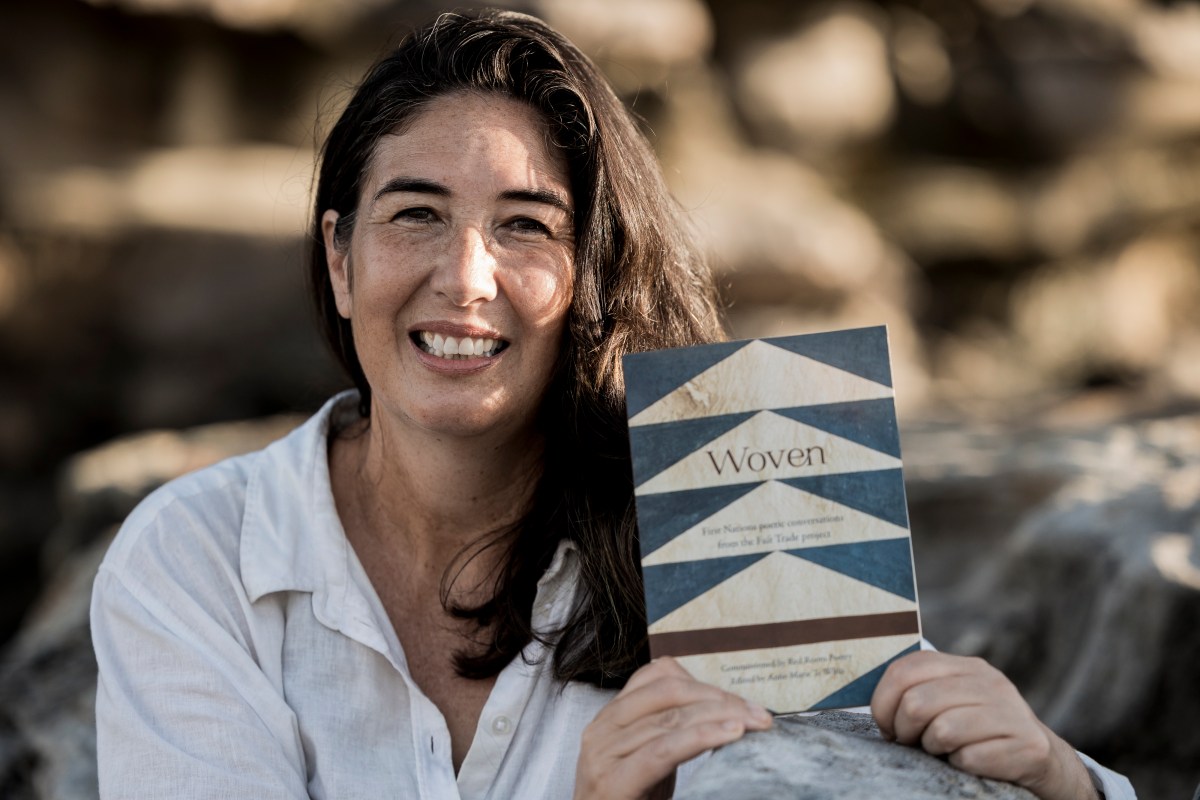Aboriginal and Torres Strait Islander readers are advised that this review contains references to people who are deceased.
Moving into the siloed experience on the shores of the “other” is perhaps one of the deepest attempts we can make to understand what has happened to people, to understand the intersectional experience of, not just spirit and blood, but of older people, of younger people, of representations that appear in language and tone – and in expressions from the margins of gender fluidity as well.
If Red Room Poetry’s anthology a line in the sand ventured into new territory by presenting a survey of contemporary Australian poetry, then Red Room’s latest anthology, Woven, is even more of a step beyond the threshold of what is possible in poetica.
Woven is imagined into being from the reeds at the water’s edge of a poetic conversation that began with Guwayu – For All Times, a Red Room poetry collection published in collaboration with Magabala Books, which featured the work of 36 First Nations poets.
This anthology, edited by Anne-Marie Te Whiu, pairs a First Nations poet with a First Nations writer from other lands, bringing Wiradjuri, Gomeroi and Yamaji Nations writers alike into a global conversation that crosses languages, lands, traditions and peoples.
Ali Cobby Eckermann writes with US Poet Laureate, Joy Harjo, of the Muscogee (Creek) Nation, Tony Birch writes with Simon J Ortiz (Pueblo of Acoma, US) and Evelyn Araluen writes with Anahera Gildea (Ngāti Tukorehe, Aotearoa New Zealand). In a dialogue with writers from Guam to Vanuatu and Sami Lands, these works traverse the poetic landscape from postcolonial ghosting to the ways cultural memory is both grieved and reclaimed. As a collective, they address the work that must be made of attempting to breathe in a post-colonial world.
Woven arises from Red Room’s Fair Trade project, which established interconnected creative partnerships between First Nations writers. This generated a co-created safe space for writers to invoke not just a consensus around their experiences in general, but also an important place to explore the loss and remembering that extends across international song lines. It extends, too, across deserts, oceans and other terrains of the heart.
As the late Archie Roach said in his poem ‘Cradle of Life’, published in a line in the sand, ‘there’s blood on the tide’. It’s a message Roach repeated to audiences – how deeply he longed for a reckoning of all that was lost to colonisation. Sadly, that tide did not change during his time.
Woven makes way for Natalie Harkin’s ‘campfires fuelled on collective rage’. It opens a space for loss to be remembered, but also for loss to be grieved. In doing so, it invites all readers into the room, regardless of nationality. It invites us all to make way for healing, by listening and hearing and by being willing to create something else out of the missed opportunities for reconciliation people like Archie Roach and many like him hunger for. It whispers of a way into a safer future for all but, most particularly, for First Nations people from all lands.
As a reviewer for ArtsHub over the last few years, I have worked with an editorial code that reserves a five-star rating for work that genuinely challenges the boundaries of an art form. Woven is the only work I have ever reviewed at that level. It is the first work of its kind, anywhere in the world.
In Woven, Natalie Harkin and Leanne Betasamosake Simpson align the challenges of COVID with the confrontation of European colonisers fronting up to shores unknown – people who dragged in their longboats a luggage of ‘viral-frontline’. In other works, colonisers become more concerned about hate crimes enacted towards their consecrated buildings than the treatment of First Nations people, or the murderous actions of monumental men, though the issues such men created bind us all to a monumental problem.
But perhaps it is in ‘The Colour Connection’ that the true work of Woven is achieved. Here, Charmaine Papertalk Green and Anna Naupa find that ‘Australia is not the White Australia that was fed into a national identity of Vegemite, thongs, meat pies’ and other tasteless accoutrements.
The trimmings of a circuit breaker create a powerful paradox, at once a point of repulsion as well as a point of contact. Yet, in an email exchange between Ellen van Neerven and Layli Long Soldier, electrified overload is used to gently pull towards community and inclusion. Their work ‘Circuit Breaker,’ confidently replaces the intersected lines of slouching Aleph characters. Their conversation is broken down and re-presented as an inquisitive dialogue that considers how a colloquy between First Nations people from around the world may best be approached.
In a poem in which two indigiqueer hotties definitely do not overshare about anything featuring big-fish, big-birds and revolutionary violence, people are expected to have their genealogy classified ‘inside a petri dish’, despite the abysmal failures of DNA testing, most significantly when Rachel Hocking’s Aboriginal descent was denied, while her European colleague Andrea Booth’s tests showed the reverse results. These events make a ‘mozza’ for big ‘corpa’ while giving DNA tests a bad name, making a metaphor of the blood that courses inside a person’s veins.
In countless lands, First Nations people are expected to pay, as Raelee Lancaster and essa may ranapiri do, to see the physical remains of their ancestors. It is a culture that leaves them ready for departure: ‘my brand of poetry is packed-suitcase-ready-to-leave’.
All of this unfolds in a world still run by binaries everywhere, where shaking fingers try to remember the ‘t-blockers’ that screen out the testosterone of colonisation’s toxic masculinity. Meanwhile poets suffer a world where ‘a woman is beautiful only if she is young and dead’.
Read: Dance review: Mutiara, Perth Festival
As a conversation between people of places from present and previous times, Woven is an exquisite collection that resonates well beyond the lands where these works were written. From the lands of the Melukerdee and Lyluequonny people of the South East Nation where I write, I stand in hope that Volume Two is already taking flight.
Woven, edited by Anne Marie Te Whiu
Publisher: Magabala Books
ISBN: 9781875641710
Format: Paperback
Pages: 160pp
Publication date: 1 February 2024
RRP: $27.99





